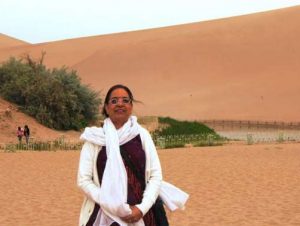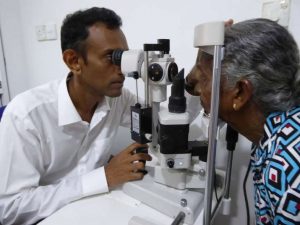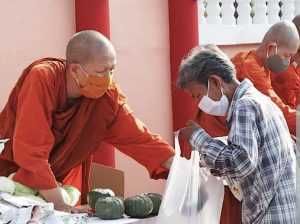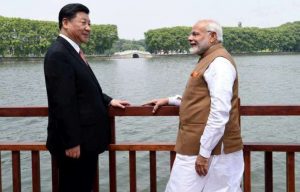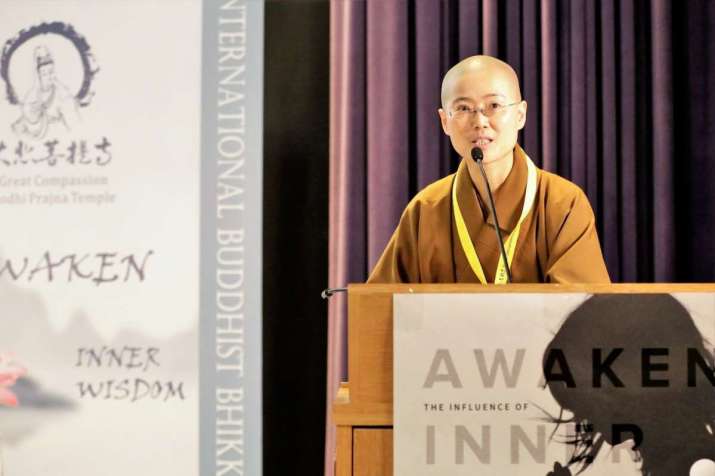
Originally from Taiwan, Venerable Master Miao Jing has lived in Canada for the last 30 years, practicing in both the Chan Buddhist tradition and the Tibetan Karma Kagyu lineage. She heads the Great Compassion Bodhi Prajna Temple, located outside Toronto, which is an active center for meditation and study with a special emphasis on cultivating Buddhist youth. The temple was also founded by her co-teacher Master Miao Yin, who also practices in the Chan and Karma Kagyu lineages.
Inspired by the work of His Holiness the 17th Karmapa to establish the North American Karma Kagyu Bhikkhuni Institute, the First International Buddhist Bhikkhuni Forum was held at the University of Toronto on 26–27 May under the theme “Awakening.” I spoke with Master Miao Jing about her motivation and plans to empower Buddhist women across all lineages.
Buddhistdoor Global: Venerable, what inspired you to have this forum?
Ven. Miao Jing: The initiative for conference, I think, is because I believe that the global Buddhist community should be a fourfold community under the Buddha’s guidance, which means having bhikkhu, bhikkuni, laymen, and laywomen with precepts, as established by the Buddha. In the 21st century, we see females receiving a lot more education and resources. There is a vision to share everything, unfortunately in some areas of the world we still see the bhikkhuni community is missing from the sangha.
I am originally from the Mahayana tradition, where there has been an unbroken lineage of bhikkhunis for almost 2,000 years. When I became a nun I decided to devote my life to the path of enlightenment to benefit all six realms of sentient beings. In the human realm, we have the female body form and the male body form, so having a fully trained bhikkhuni sangha is very important for the 21st century.
I initially conceived of this forum as a way to attract bhikkhuni leaders, the founders, to manifest the vision, share resources, and offer bonding and support for each other in order to make the female practitioner community a global vision for the future. So, that is the very broad view, and in the time of the Buddha this was also his vision.
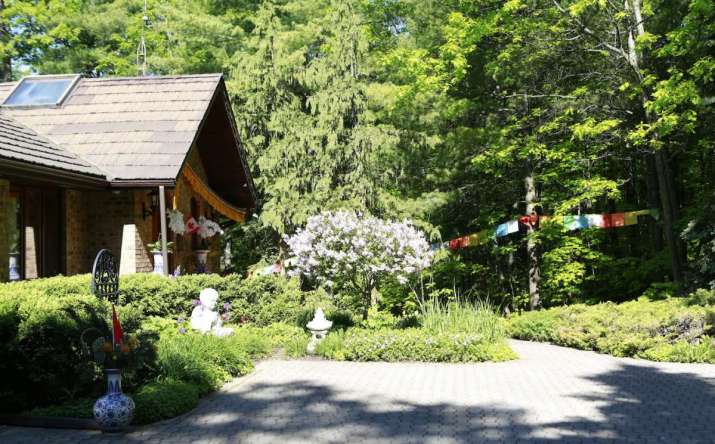
BDG: What is unique about this forum?
VMJ: There are so many different lineages and female practitioners seeking a full Buddhist education. So many have come to our temple seeking resources and guidance and to feel supported. This led me to feel, more and more, that someone needed to stand up and organize a forum that could receive representatives from all Buddhist lineages.
Our goal is to bring these lineages together to awaken the empowerment of inner wisdom. We realize that the role of the female is not only to take care of the family, or to feel the inequality of society. We need to awaken inner compassion and wisdom, so I think this is a unique opportunity to come together to co-operate in putting together this forum.
We received support from the Ho Center of Buddhist Studies at the University of Toronto and the faculty of professors of Buddhist studies in terms of academic support, and in terms of support from practitioners, we have bhikkhunis who have come from very far away. We were very excited and happy to receive all of them and we hope that by having this kind of cross-cultural exchange, we can all shape our vision and broaden our view, with the goal of restoring the vision of the Buddha’s fourfold sangha.
BDG: Who are some of the notable figures who attended the conference?
VMJ: Among the international speakers, from Beijing we have Ven. Yi Fa, founder of the Woodenfish Foundation. She is very experienced in spreading the Dharma in the West, having lived for 30 years in the United States. Besides that we also had academic presenters from different universities, some from monastic communities. So we were very excited to have this multifaceted platform of exchange.
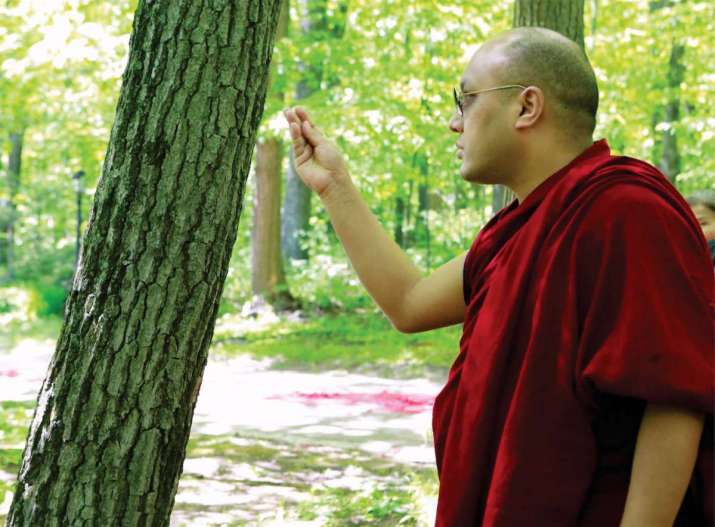
BDG: What key topics were discussed at the forum?
VMJ: The key components of the forum were, firstly, speeches on various topics, the presentation of academic papers, and then roundtable discussions for each day. Each day focused on a main topic. The first day was the significance of the restoration of the bhikkhuni lineage in the Tibetan tradition. The second day’s topic was female practitioners from across East and West in the 21st century. So we explored these two major themes. And we had Dr. Francis Garrett from the Ho Center for Buddhist Studies giving a welcome speech.
We also had an address via streaming video from His Holiness the Karmapa in the form of a greeting and an encouragement. As a signature activity, during the closing all participants were encouraged to sign a declaration form in support of the restoration of broken bhikkhuni lineages, as well as support for full training for female practitioners. We feel this signing will also help support the inner awakening of female Buddhist practitioners, from lay training all the way to full ordination.
For example, last year His Holiness the Karmapa invited Mahayana lineage bhikkhunis to India to give the first vow toward the restoration of the Tibetan lineage. In the next 3–5 years, we will have the Tibetan bhikkhuni lineage restoration. We hope this inspire others in all schools of Buddhism to grow together, and we hope we can bond our hearts together through participating in this forum.
We also plan to support bhikkhunis in holding the vision of the Buddhadharma in the future. It’s very important to have full training, to awaken wisdom and compassion. When you shave your head and decide to commit hold the Buddhadharma full time, it is very critical—in the 21st century and particularly in the West—to have training and support. So we were looking forward to creating an atmosphere here together toward that goal.
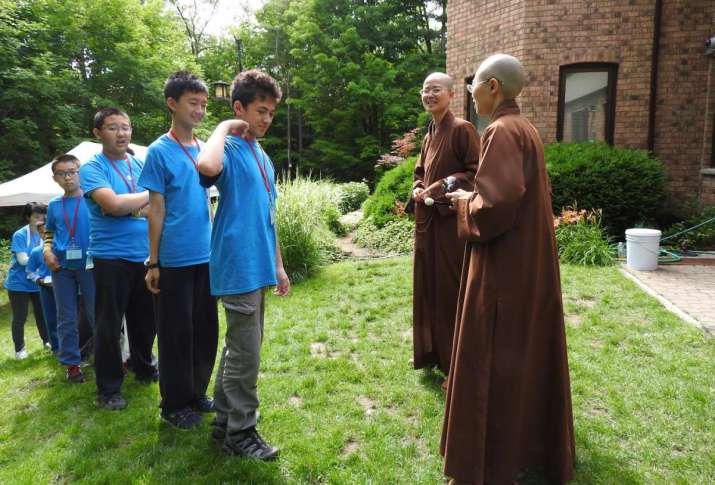
See more
NAKKBI: North American Karma Kagyu Bhikkhuni Institute
Great Compassion Bodhi Prajna Temple
University of Toronto: The Robert H. N. Ho Family Foundation Centre for Buddhist Studiesga



